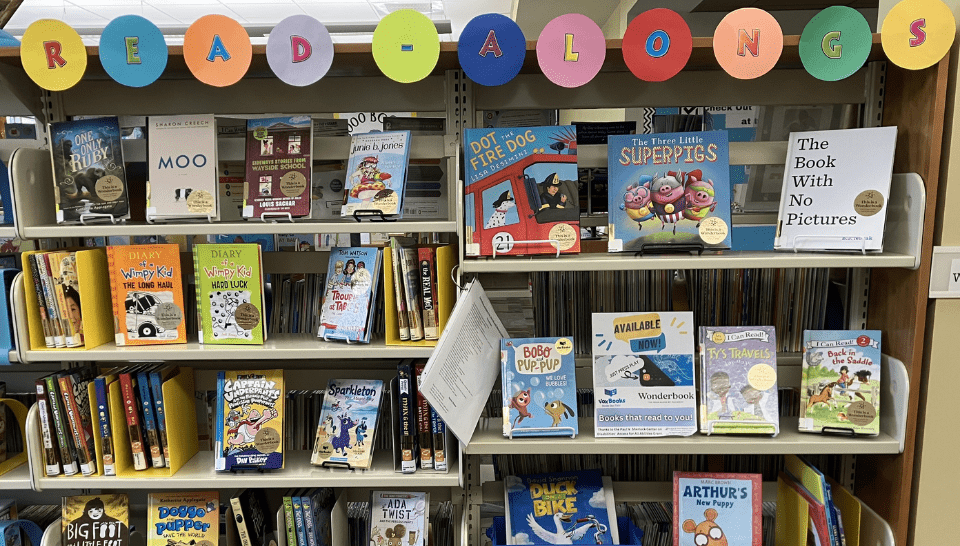
“The response was electric. For weeks ... we noticed kids would come into the Children’s Department and ask for the talking books.” – Library Director Beth Ullucci
For parents and caregivers looking for ways to help children read, librarians at the Jesse M. Smith Memorial Library in Harrisville often recommend listening to an audiobook while following along with the print version. But its collection of books on CD was inaccessible for many who didn’t have a way to play them.
A 2023 Paul V. Sherlock Center Access for All Mini Grant helped change that.
Patrons wanted to try audiobooks to improve their child’s literacy, but when shown the library’s collection of books on CD, most said they didn’t own a CD player. Many new cars don’t come with one, either. And while the library offers downloadable e-audiobooks, the library staff found many aren’t interested in reading on a screen or needing an electronic device to access audio.
Enter audio-enabled books – hardcover books that have a small audiobook player built right into the front cover.
Following along with the text while listening to the audio read aloud by a professional narrator gives children examples of how to read with fluency, correct pronunciation and inflection. They aren’t hindered by words they can’t read, so they can focus on strengthening comprehension skills and enjoy a story that might be above their independent reading level. This approach can be beneficial for struggling readers as well as for individuals with vision impairments, ADHD, dyslexia and other learning disabilities.
The library purchased Wonderbooks, from Playaway Products, and VOX books, produced by Library Ideas, LLC. Both types of audio-enabled books are available in popular titles in picture books, beginning readers, chapter books, nonfiction and graphic novel formats.
The all-in-one design makes the book fully portable. An internet connection, batteries, cords and electronic devices are not needed. Features include read-aloud mode with the ability to pause and change the volume, and listeners also can use ear buds or headphones. A micro-USB port allows for easy home charging. Wonderbooks include comprehension questions after the story.
“These audio-enabled books are interactive and fun. With sound effects and engaging narrators, these books help engage readers while also promoting independence and confidence. Listeners are not dependent on someone else to read to them,” said Library Director Beth Ullucci.
When the books arrived, a children’s librarian brought one to all of her school visits with grades K-4 and their teachers.
“The response was electric,” she said. “For weeks after that, kids would come into the Children’s Department and ask for the talking books. Many parents were confused about what their children were asking for. It was a perfect transition to showing the family our updated audio-visual collection and how the audio-enabled books worked. We had many families check out the materials after that introduction.”
The library’s collection includes chapter book series such as “Diary of a Wimpy Kid,” “Big Nate,” “Captain Underpants” and “Junie B. Jones.” For younger readers, picture books and beginning readers feature “Pete the Cat,” “The Bad Seed,” “The Day the Crayons Quit,” “Frog and Toad” and “Fly Guy.” Nonfiction books include topics such as trains, sharks, the Titanic, plants and outer space.
One mother of a struggling reader told library staff that her son loves the independence of using the read-alongs on his own for his nightly reading and particularly enjoyed the books about sharks. Another parent said the large-print chapter audio-enabled books have been great for her young adult with special needs.
Another library patron sent this email: “I just wanted to let you know that my kids LOVE the Wonderbooks! I have a 9-year-old daughter that does not like to read and she loves sitting and following along with the Wonderbooks. My 6-year-old also loves them and can’t wait to go back to the library to get more! Thank you!”
The audio-enabled books are on permanent display in a high-traffic area of the Children’s Department with signs explaining how the books work, and staff members are always willing to demonstrate how to use them.
Ullucci said receiving the Sherlock Center Access for All Mini Grant funding was key to updating the library’s collection, given the significant cost of the books.
“It was also an investment for a new item that we were not sure would be popular with our patrons. The only way our library would have the opportunity to try out these new items would be through grant funding,” she said.
With the grant, the library purchased about 65 audio-enabled books to start its collection. The positive response and high circulation rates for this collection encouraged the library to purchase additional audio-enabled books to add to the base that the grant provided. The library’s collection now numbers about 95.
